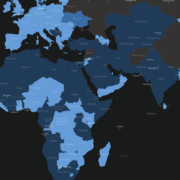Businesses that rush to adopt technologies that are driving digital revolution in Africa, including the Internet of Things, might not achieve the desired results because of failure to consider the relevance of data analytics says Sulemana Abubakar, CIO for GE Africa.
He adds that simply implementing these technologies without considering the value of the data they generate or subsequent insights and intelligence they provide will actually hinder innovation.
“Imagine a jet engine on an airline and that engine has smart sensors collecting information about the operations of the engine: vibration, temperature and fuel consumption. Once this information is collected we use the internet to transfer all that information into the cloud. All that information collected is useless unless we use analytics against that data and then mine that data to get insights to drive specific business outcomes,” says Abubakar.
With data, companies can monitor their instruments of operation to make their systems more efficient and improve their business operations.
Abubakar explains that companies globally continue to ponder various ways to leverage the technologies.
“I wouldn’t say Africa is behind because we are on a journey globally. Even if you take the western world, IoT, big data and analytics are things they are all aspiring to – and leveraging of – they are also on a journey. But if you look at Africa, specifically the power and mining industries have made the most significant inroads into the digital industrial world.”
Abubakar says that the desire to strengthen productivity is the key driving force behind industrial internet.
“The internet, big data and analytics are enabling technologies,” Abubakar continues, “but the key reason why we are seeing digitalisation globally is the productivity gains that we would get and the significant improvement in efficiency, ultimately leading to better business outcomes.”
GE Africa is focused on projects with mining companies on the continent based on the transformation of real-time machined data into actionable production efficiency metrics.
The company is also investing in a multi-million dollar facility in Calabar, Nigeria.
“The facility will eventually manage power services repair and maintenance and other GE business operations in the sub-region. The investment will significantly increase the local content of GE’s operations in Nigeria by growing local ownership of equipment, in-country project execution expertise and use of local legal and engineering services,” according to a statement issued by the company.
Source: ITWebafrica.com












Comments